University Essay: Positive Psychology's Relevance and Effects Analysis
VerifiedAdded on 2022/10/19
|7
|1534
|29
Essay
AI Summary
This essay delves into the multifaceted field of positive psychology, examining its relevance and effects on educational and institutional outcomes. The author introduces the core concepts of positive psychology, including happiness, optimism, and personal growth, and highlights the challenges society faces today. The essay is structured around a discussion of four scholarly articles, two supporting the positive impacts of positive psychology and two offering critical perspectives. The supporting articles by Seligman and Schwartz emphasize the importance of positive attributes and signature strengths in achieving a happy and healthy lifestyle. Conversely, the critiques by Held and Wong raise concerns about the potential negative effects of positive psychology, such as elitism, overemphasis on positivity, and a lack of holistic understanding of individuals. The essay concludes by acknowledging the potential benefits of positive psychology while also advocating for a more objective and research-driven approach to address its limitations and ensure its effective application in contemporary contexts. The essay uses Harvard referencing style and incorporates relevant research to form a cohesive argument, as per the assignment brief.
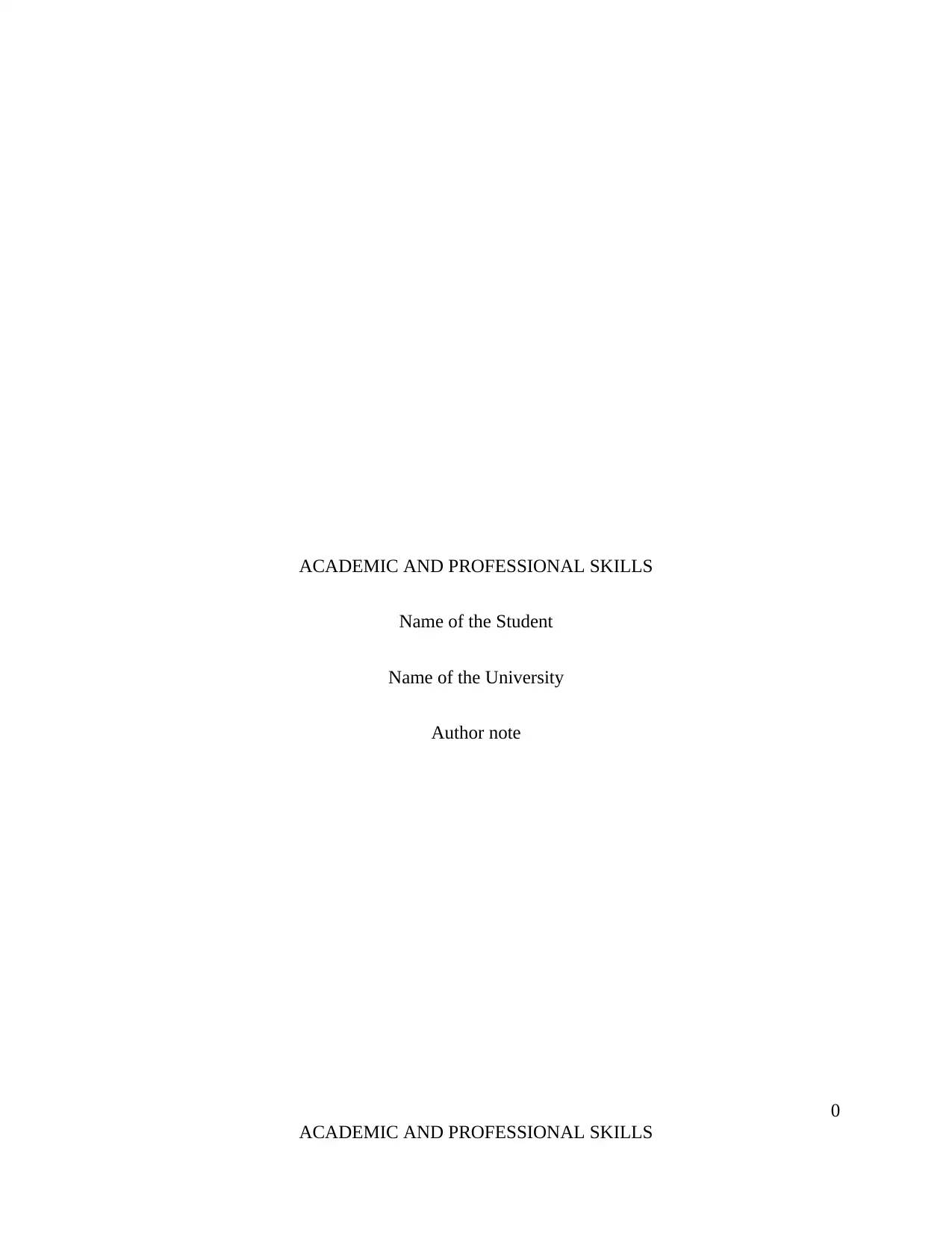
ACADEMIC AND PROFESSIONAL SKILLS
Name of the Student
Name of the University
Author note
0
ACADEMIC AND PROFESSIONAL SKILLS
Name of the Student
Name of the University
Author note
0
ACADEMIC AND PROFESSIONAL SKILLS
Paraphrase This Document
Need a fresh take? Get an instant paraphrase of this document with our AI Paraphraser
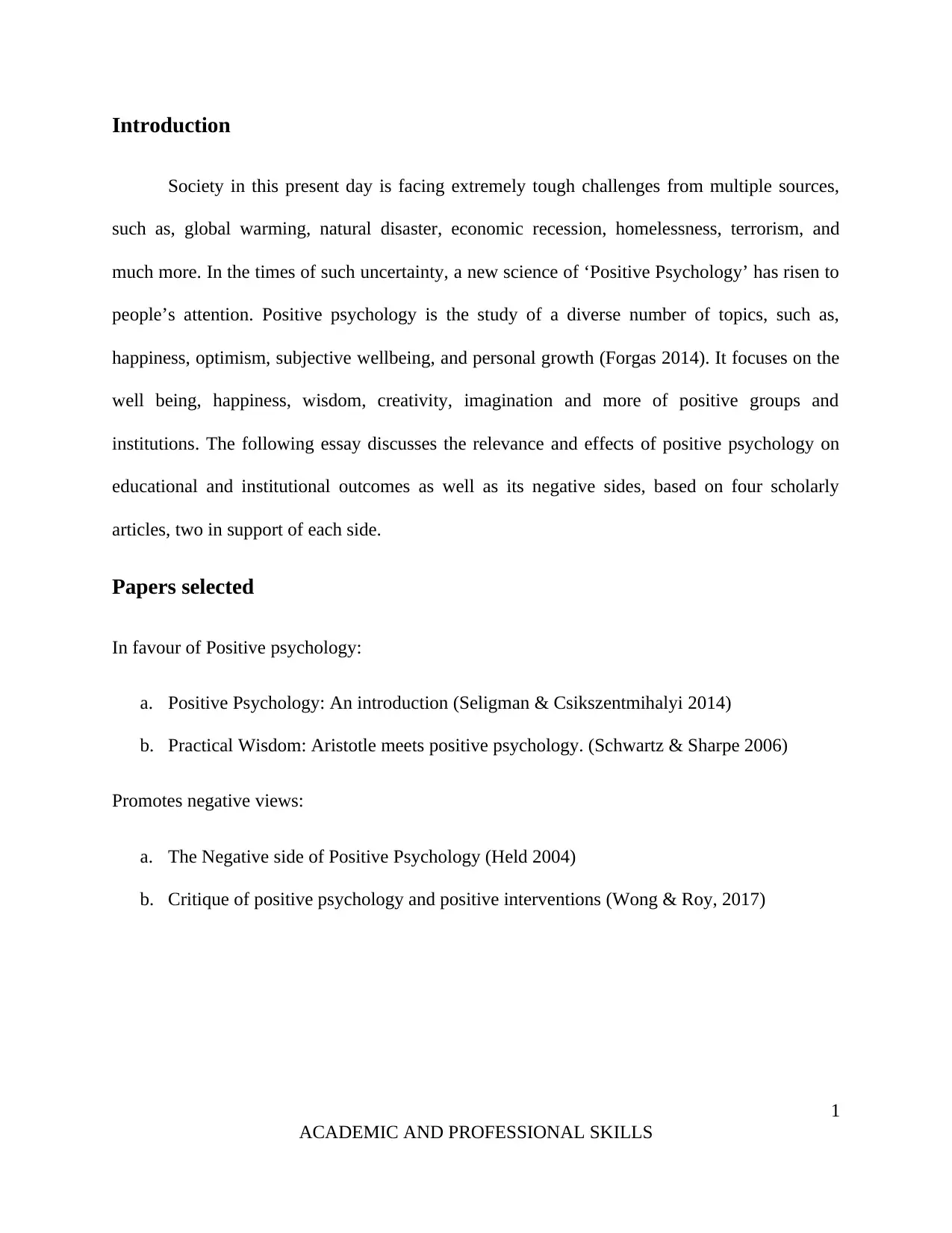
Introduction
Society in this present day is facing extremely tough challenges from multiple sources,
such as, global warming, natural disaster, economic recession, homelessness, terrorism, and
much more. In the times of such uncertainty, a new science of ‘Positive Psychology’ has risen to
people’s attention. Positive psychology is the study of a diverse number of topics, such as,
happiness, optimism, subjective wellbeing, and personal growth (Forgas 2014). It focuses on the
well being, happiness, wisdom, creativity, imagination and more of positive groups and
institutions. The following essay discusses the relevance and effects of positive psychology on
educational and institutional outcomes as well as its negative sides, based on four scholarly
articles, two in support of each side.
Papers selected
In favour of Positive psychology:
a. Positive Psychology: An introduction (Seligman & Csikszentmihalyi 2014)
b. Practical Wisdom: Aristotle meets positive psychology. (Schwartz & Sharpe 2006)
Promotes negative views:
a. The Negative side of Positive Psychology (Held 2004)
b. Critique of positive psychology and positive interventions (Wong & Roy, 2017)
1
ACADEMIC AND PROFESSIONAL SKILLS
Society in this present day is facing extremely tough challenges from multiple sources,
such as, global warming, natural disaster, economic recession, homelessness, terrorism, and
much more. In the times of such uncertainty, a new science of ‘Positive Psychology’ has risen to
people’s attention. Positive psychology is the study of a diverse number of topics, such as,
happiness, optimism, subjective wellbeing, and personal growth (Forgas 2014). It focuses on the
well being, happiness, wisdom, creativity, imagination and more of positive groups and
institutions. The following essay discusses the relevance and effects of positive psychology on
educational and institutional outcomes as well as its negative sides, based on four scholarly
articles, two in support of each side.
Papers selected
In favour of Positive psychology:
a. Positive Psychology: An introduction (Seligman & Csikszentmihalyi 2014)
b. Practical Wisdom: Aristotle meets positive psychology. (Schwartz & Sharpe 2006)
Promotes negative views:
a. The Negative side of Positive Psychology (Held 2004)
b. Critique of positive psychology and positive interventions (Wong & Roy, 2017)
1
ACADEMIC AND PROFESSIONAL SKILLS
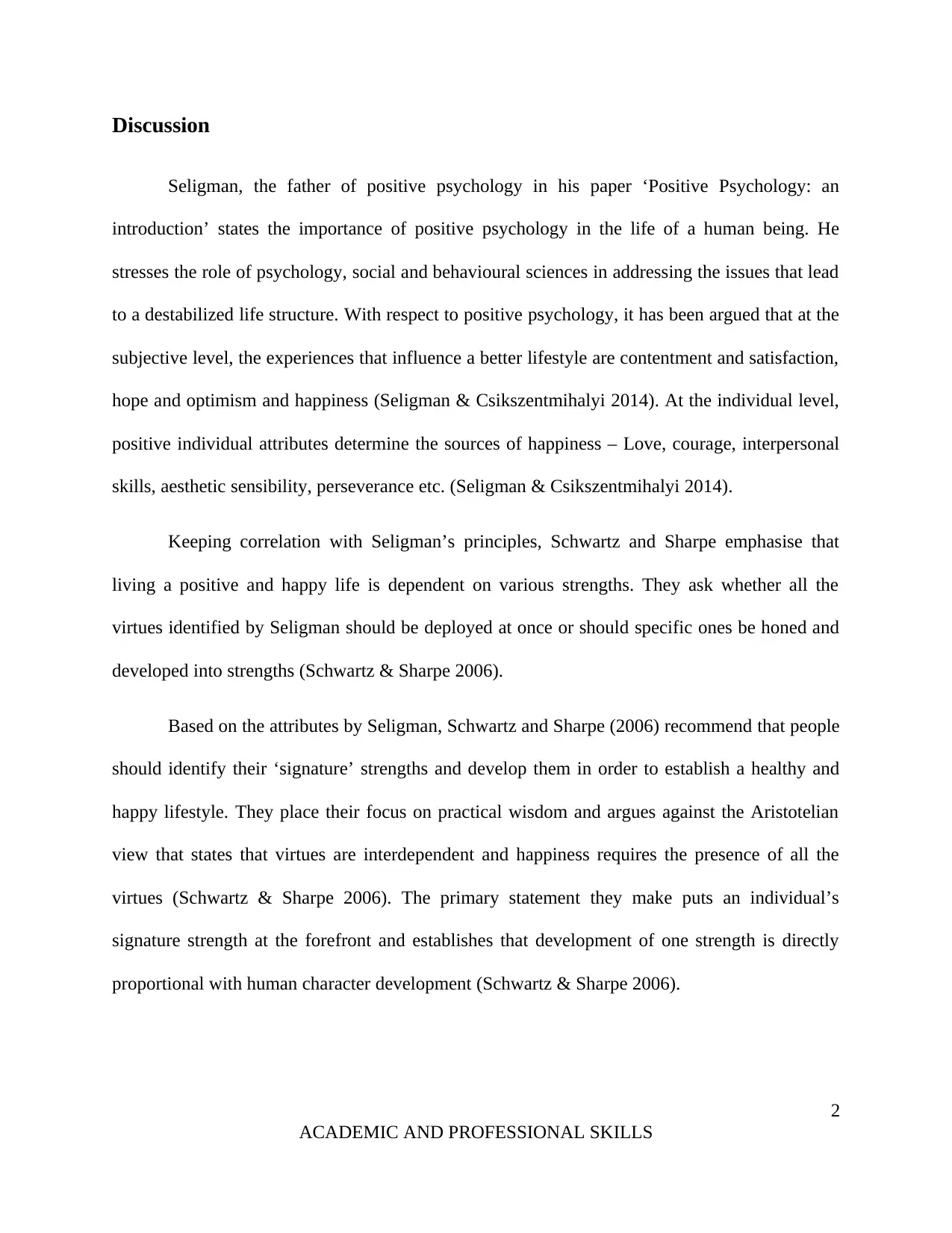
Discussion
Seligman, the father of positive psychology in his paper ‘Positive Psychology: an
introduction’ states the importance of positive psychology in the life of a human being. He
stresses the role of psychology, social and behavioural sciences in addressing the issues that lead
to a destabilized life structure. With respect to positive psychology, it has been argued that at the
subjective level, the experiences that influence a better lifestyle are contentment and satisfaction,
hope and optimism and happiness (Seligman & Csikszentmihalyi 2014). At the individual level,
positive individual attributes determine the sources of happiness – Love, courage, interpersonal
skills, aesthetic sensibility, perseverance etc. (Seligman & Csikszentmihalyi 2014).
Keeping correlation with Seligman’s principles, Schwartz and Sharpe emphasise that
living a positive and happy life is dependent on various strengths. They ask whether all the
virtues identified by Seligman should be deployed at once or should specific ones be honed and
developed into strengths (Schwartz & Sharpe 2006).
Based on the attributes by Seligman, Schwartz and Sharpe (2006) recommend that people
should identify their ‘signature’ strengths and develop them in order to establish a healthy and
happy lifestyle. They place their focus on practical wisdom and argues against the Aristotelian
view that states that virtues are interdependent and happiness requires the presence of all the
virtues (Schwartz & Sharpe 2006). The primary statement they make puts an individual’s
signature strength at the forefront and establishes that development of one strength is directly
proportional with human character development (Schwartz & Sharpe 2006).
2
ACADEMIC AND PROFESSIONAL SKILLS
Seligman, the father of positive psychology in his paper ‘Positive Psychology: an
introduction’ states the importance of positive psychology in the life of a human being. He
stresses the role of psychology, social and behavioural sciences in addressing the issues that lead
to a destabilized life structure. With respect to positive psychology, it has been argued that at the
subjective level, the experiences that influence a better lifestyle are contentment and satisfaction,
hope and optimism and happiness (Seligman & Csikszentmihalyi 2014). At the individual level,
positive individual attributes determine the sources of happiness – Love, courage, interpersonal
skills, aesthetic sensibility, perseverance etc. (Seligman & Csikszentmihalyi 2014).
Keeping correlation with Seligman’s principles, Schwartz and Sharpe emphasise that
living a positive and happy life is dependent on various strengths. They ask whether all the
virtues identified by Seligman should be deployed at once or should specific ones be honed and
developed into strengths (Schwartz & Sharpe 2006).
Based on the attributes by Seligman, Schwartz and Sharpe (2006) recommend that people
should identify their ‘signature’ strengths and develop them in order to establish a healthy and
happy lifestyle. They place their focus on practical wisdom and argues against the Aristotelian
view that states that virtues are interdependent and happiness requires the presence of all the
virtues (Schwartz & Sharpe 2006). The primary statement they make puts an individual’s
signature strength at the forefront and establishes that development of one strength is directly
proportional with human character development (Schwartz & Sharpe 2006).
2
ACADEMIC AND PROFESSIONAL SKILLS
⊘ This is a preview!⊘
Do you want full access?
Subscribe today to unlock all pages.

Trusted by 1+ million students worldwide
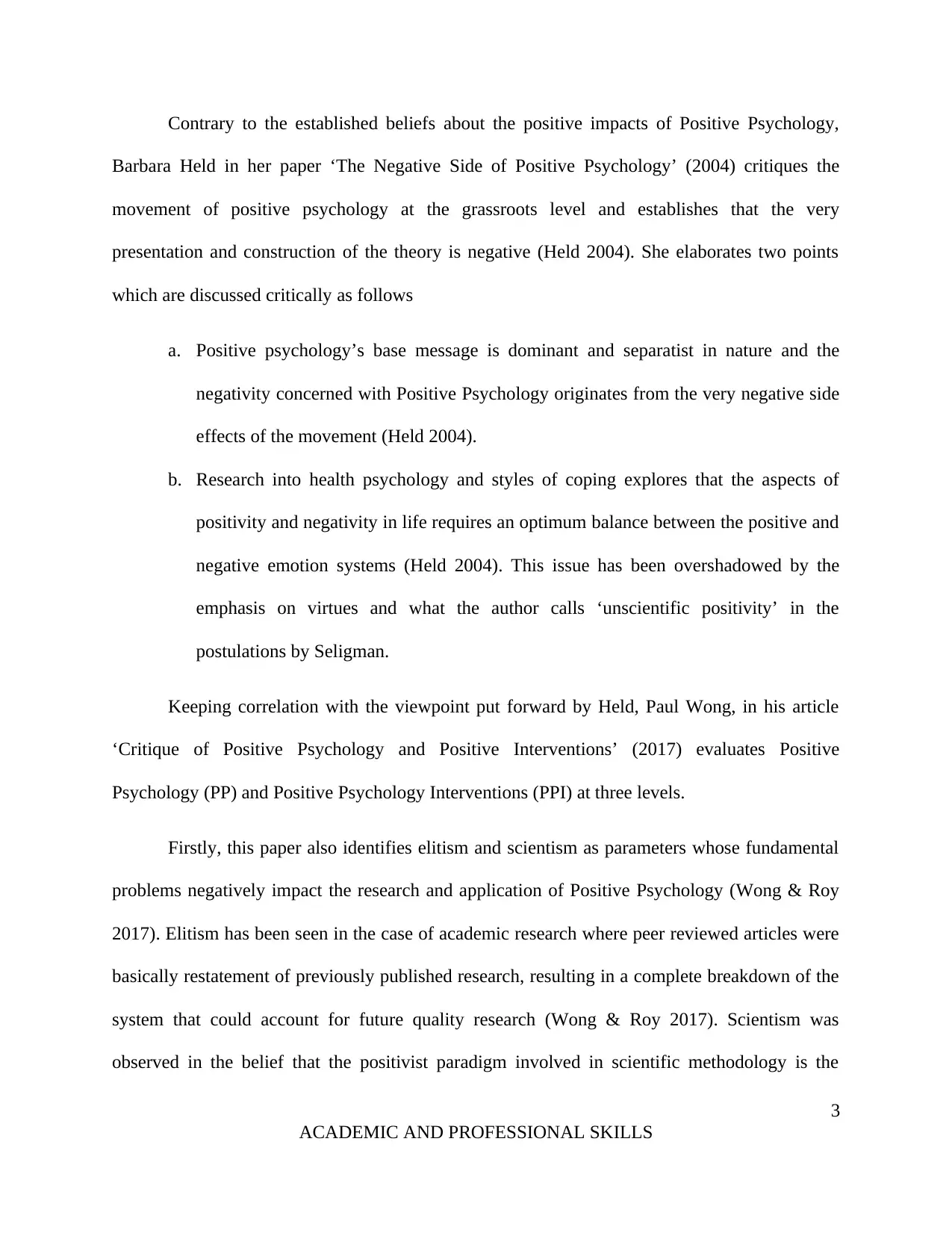
Contrary to the established beliefs about the positive impacts of Positive Psychology,
Barbara Held in her paper ‘The Negative Side of Positive Psychology’ (2004) critiques the
movement of positive psychology at the grassroots level and establishes that the very
presentation and construction of the theory is negative (Held 2004). She elaborates two points
which are discussed critically as follows
a. Positive psychology’s base message is dominant and separatist in nature and the
negativity concerned with Positive Psychology originates from the very negative side
effects of the movement (Held 2004).
b. Research into health psychology and styles of coping explores that the aspects of
positivity and negativity in life requires an optimum balance between the positive and
negative emotion systems (Held 2004). This issue has been overshadowed by the
emphasis on virtues and what the author calls ‘unscientific positivity’ in the
postulations by Seligman.
Keeping correlation with the viewpoint put forward by Held, Paul Wong, in his article
‘Critique of Positive Psychology and Positive Interventions’ (2017) evaluates Positive
Psychology (PP) and Positive Psychology Interventions (PPI) at three levels.
Firstly, this paper also identifies elitism and scientism as parameters whose fundamental
problems negatively impact the research and application of Positive Psychology (Wong & Roy
2017). Elitism has been seen in the case of academic research where peer reviewed articles were
basically restatement of previously published research, resulting in a complete breakdown of the
system that could account for future quality research (Wong & Roy 2017). Scientism was
observed in the belief that the positivist paradigm involved in scientific methodology is the
3
ACADEMIC AND PROFESSIONAL SKILLS
Barbara Held in her paper ‘The Negative Side of Positive Psychology’ (2004) critiques the
movement of positive psychology at the grassroots level and establishes that the very
presentation and construction of the theory is negative (Held 2004). She elaborates two points
which are discussed critically as follows
a. Positive psychology’s base message is dominant and separatist in nature and the
negativity concerned with Positive Psychology originates from the very negative side
effects of the movement (Held 2004).
b. Research into health psychology and styles of coping explores that the aspects of
positivity and negativity in life requires an optimum balance between the positive and
negative emotion systems (Held 2004). This issue has been overshadowed by the
emphasis on virtues and what the author calls ‘unscientific positivity’ in the
postulations by Seligman.
Keeping correlation with the viewpoint put forward by Held, Paul Wong, in his article
‘Critique of Positive Psychology and Positive Interventions’ (2017) evaluates Positive
Psychology (PP) and Positive Psychology Interventions (PPI) at three levels.
Firstly, this paper also identifies elitism and scientism as parameters whose fundamental
problems negatively impact the research and application of Positive Psychology (Wong & Roy
2017). Elitism has been seen in the case of academic research where peer reviewed articles were
basically restatement of previously published research, resulting in a complete breakdown of the
system that could account for future quality research (Wong & Roy 2017). Scientism was
observed in the belief that the positivist paradigm involved in scientific methodology is the
3
ACADEMIC AND PROFESSIONAL SKILLS
Paraphrase This Document
Need a fresh take? Get an instant paraphrase of this document with our AI Paraphraser
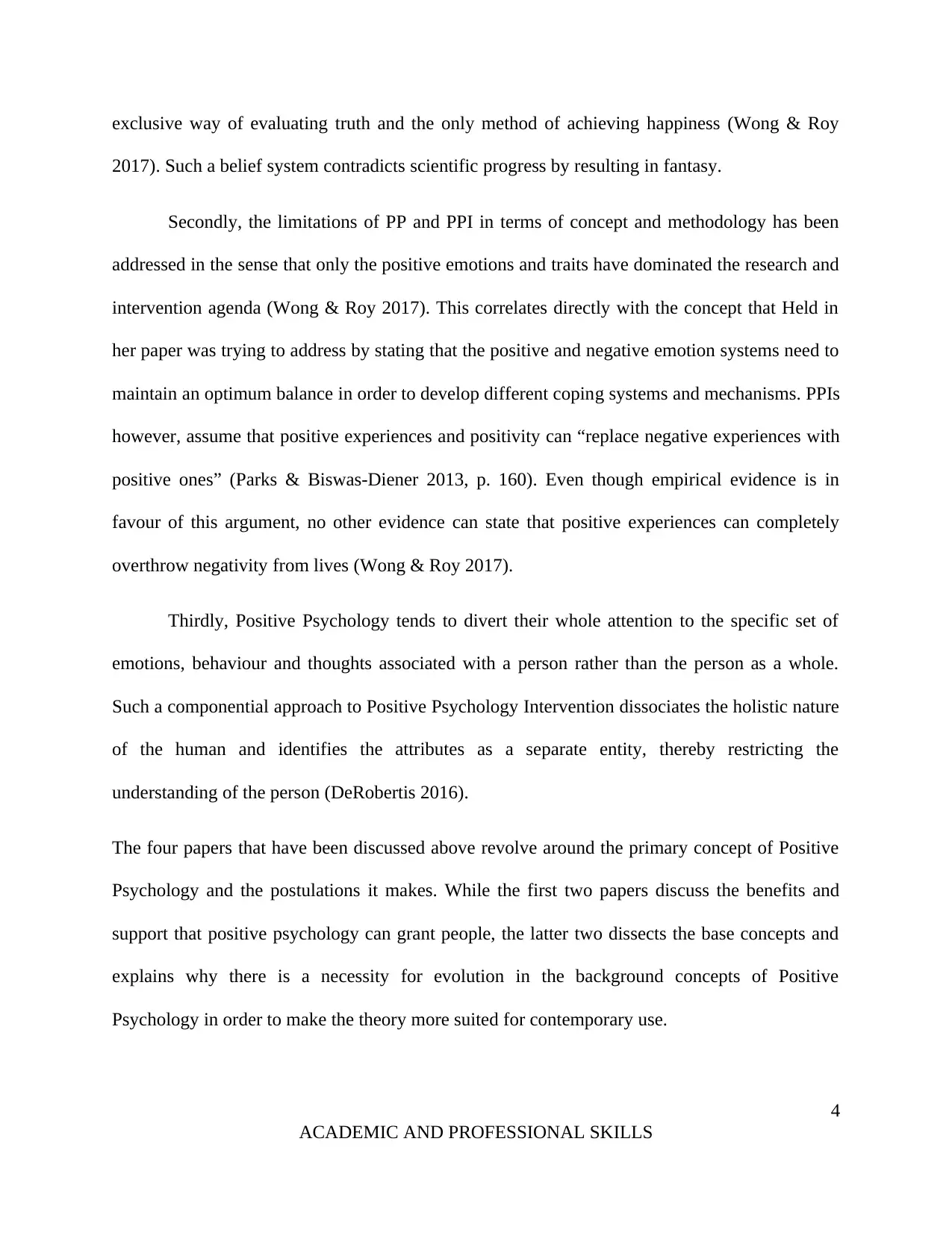
exclusive way of evaluating truth and the only method of achieving happiness (Wong & Roy
2017). Such a belief system contradicts scientific progress by resulting in fantasy.
Secondly, the limitations of PP and PPI in terms of concept and methodology has been
addressed in the sense that only the positive emotions and traits have dominated the research and
intervention agenda (Wong & Roy 2017). This correlates directly with the concept that Held in
her paper was trying to address by stating that the positive and negative emotion systems need to
maintain an optimum balance in order to develop different coping systems and mechanisms. PPIs
however, assume that positive experiences and positivity can “replace negative experiences with
positive ones” (Parks & Biswas-Diener 2013, p. 160). Even though empirical evidence is in
favour of this argument, no other evidence can state that positive experiences can completely
overthrow negativity from lives (Wong & Roy 2017).
Thirdly, Positive Psychology tends to divert their whole attention to the specific set of
emotions, behaviour and thoughts associated with a person rather than the person as a whole.
Such a componential approach to Positive Psychology Intervention dissociates the holistic nature
of the human and identifies the attributes as a separate entity, thereby restricting the
understanding of the person (DeRobertis 2016).
The four papers that have been discussed above revolve around the primary concept of Positive
Psychology and the postulations it makes. While the first two papers discuss the benefits and
support that positive psychology can grant people, the latter two dissects the base concepts and
explains why there is a necessity for evolution in the background concepts of Positive
Psychology in order to make the theory more suited for contemporary use.
4
ACADEMIC AND PROFESSIONAL SKILLS
2017). Such a belief system contradicts scientific progress by resulting in fantasy.
Secondly, the limitations of PP and PPI in terms of concept and methodology has been
addressed in the sense that only the positive emotions and traits have dominated the research and
intervention agenda (Wong & Roy 2017). This correlates directly with the concept that Held in
her paper was trying to address by stating that the positive and negative emotion systems need to
maintain an optimum balance in order to develop different coping systems and mechanisms. PPIs
however, assume that positive experiences and positivity can “replace negative experiences with
positive ones” (Parks & Biswas-Diener 2013, p. 160). Even though empirical evidence is in
favour of this argument, no other evidence can state that positive experiences can completely
overthrow negativity from lives (Wong & Roy 2017).
Thirdly, Positive Psychology tends to divert their whole attention to the specific set of
emotions, behaviour and thoughts associated with a person rather than the person as a whole.
Such a componential approach to Positive Psychology Intervention dissociates the holistic nature
of the human and identifies the attributes as a separate entity, thereby restricting the
understanding of the person (DeRobertis 2016).
The four papers that have been discussed above revolve around the primary concept of Positive
Psychology and the postulations it makes. While the first two papers discuss the benefits and
support that positive psychology can grant people, the latter two dissects the base concepts and
explains why there is a necessity for evolution in the background concepts of Positive
Psychology in order to make the theory more suited for contemporary use.
4
ACADEMIC AND PROFESSIONAL SKILLS
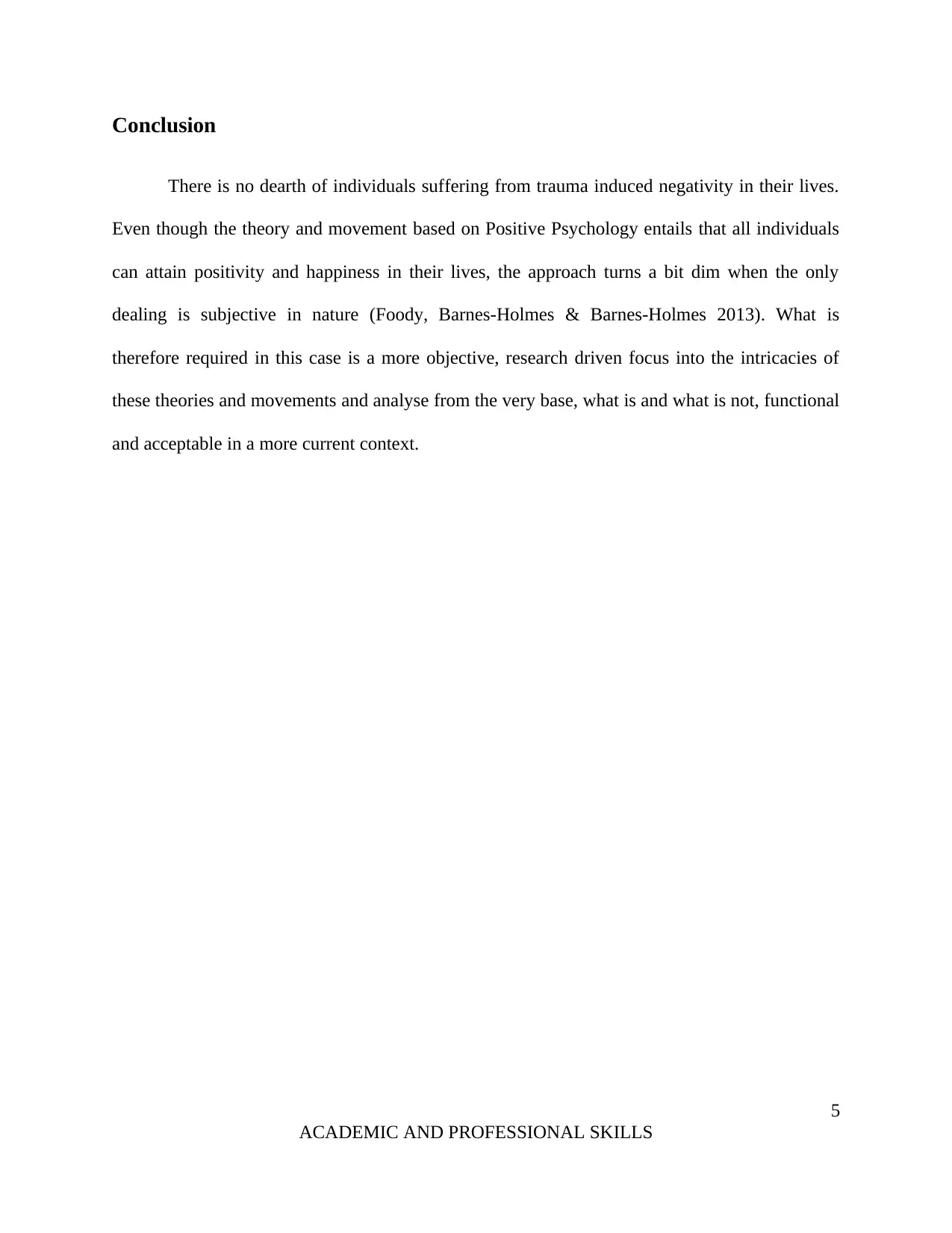
Conclusion
There is no dearth of individuals suffering from trauma induced negativity in their lives.
Even though the theory and movement based on Positive Psychology entails that all individuals
can attain positivity and happiness in their lives, the approach turns a bit dim when the only
dealing is subjective in nature (Foody, Barnes-Holmes & Barnes-Holmes 2013). What is
therefore required in this case is a more objective, research driven focus into the intricacies of
these theories and movements and analyse from the very base, what is and what is not, functional
and acceptable in a more current context.
5
ACADEMIC AND PROFESSIONAL SKILLS
There is no dearth of individuals suffering from trauma induced negativity in their lives.
Even though the theory and movement based on Positive Psychology entails that all individuals
can attain positivity and happiness in their lives, the approach turns a bit dim when the only
dealing is subjective in nature (Foody, Barnes-Holmes & Barnes-Holmes 2013). What is
therefore required in this case is a more objective, research driven focus into the intricacies of
these theories and movements and analyse from the very base, what is and what is not, functional
and acceptable in a more current context.
5
ACADEMIC AND PROFESSIONAL SKILLS
⊘ This is a preview!⊘
Do you want full access?
Subscribe today to unlock all pages.

Trusted by 1+ million students worldwide
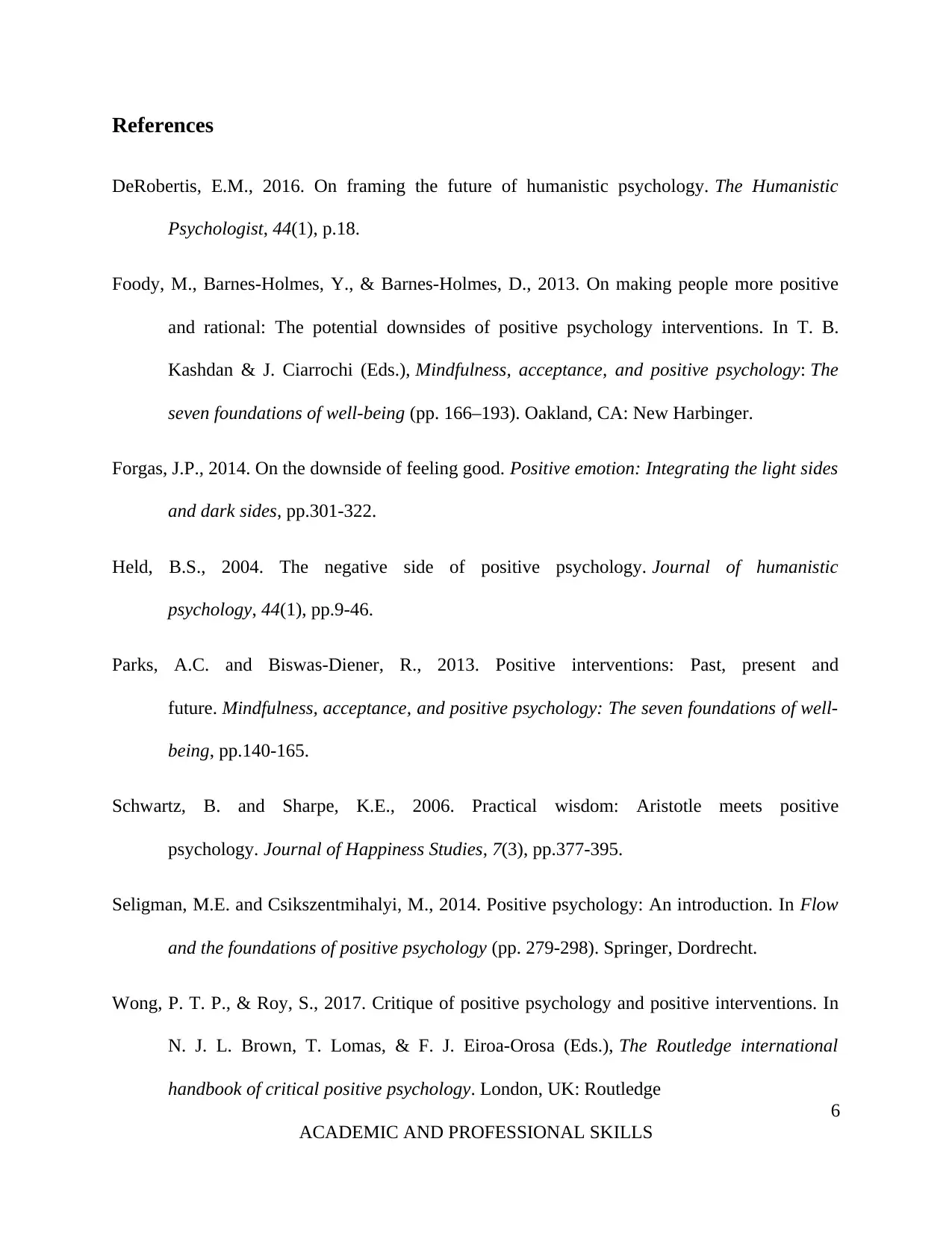
References
DeRobertis, E.M., 2016. On framing the future of humanistic psychology. The Humanistic
Psychologist, 44(1), p.18.
Foody, M., Barnes-Holmes, Y., & Barnes-Holmes, D., 2013. On making people more positive
and rational: The potential downsides of positive psychology interventions. In T. B.
Kashdan & J. Ciarrochi (Eds.), Mindfulness, acceptance, and positive psychology: The
seven foundations of well-being (pp. 166–193). Oakland, CA: New Harbinger.
Forgas, J.P., 2014. On the downside of feeling good. Positive emotion: Integrating the light sides
and dark sides, pp.301-322.
Held, B.S., 2004. The negative side of positive psychology. Journal of humanistic
psychology, 44(1), pp.9-46.
Parks, A.C. and Biswas-Diener, R., 2013. Positive interventions: Past, present and
future. Mindfulness, acceptance, and positive psychology: The seven foundations of well-
being, pp.140-165.
Schwartz, B. and Sharpe, K.E., 2006. Practical wisdom: Aristotle meets positive
psychology. Journal of Happiness Studies, 7(3), pp.377-395.
Seligman, M.E. and Csikszentmihalyi, M., 2014. Positive psychology: An introduction. In Flow
and the foundations of positive psychology (pp. 279-298). Springer, Dordrecht.
Wong, P. T. P., & Roy, S., 2017. Critique of positive psychology and positive interventions. In
N. J. L. Brown, T. Lomas, & F. J. Eiroa-Orosa (Eds.), The Routledge international
handbook of critical positive psychology. London, UK: Routledge
6
ACADEMIC AND PROFESSIONAL SKILLS
DeRobertis, E.M., 2016. On framing the future of humanistic psychology. The Humanistic
Psychologist, 44(1), p.18.
Foody, M., Barnes-Holmes, Y., & Barnes-Holmes, D., 2013. On making people more positive
and rational: The potential downsides of positive psychology interventions. In T. B.
Kashdan & J. Ciarrochi (Eds.), Mindfulness, acceptance, and positive psychology: The
seven foundations of well-being (pp. 166–193). Oakland, CA: New Harbinger.
Forgas, J.P., 2014. On the downside of feeling good. Positive emotion: Integrating the light sides
and dark sides, pp.301-322.
Held, B.S., 2004. The negative side of positive psychology. Journal of humanistic
psychology, 44(1), pp.9-46.
Parks, A.C. and Biswas-Diener, R., 2013. Positive interventions: Past, present and
future. Mindfulness, acceptance, and positive psychology: The seven foundations of well-
being, pp.140-165.
Schwartz, B. and Sharpe, K.E., 2006. Practical wisdom: Aristotle meets positive
psychology. Journal of Happiness Studies, 7(3), pp.377-395.
Seligman, M.E. and Csikszentmihalyi, M., 2014. Positive psychology: An introduction. In Flow
and the foundations of positive psychology (pp. 279-298). Springer, Dordrecht.
Wong, P. T. P., & Roy, S., 2017. Critique of positive psychology and positive interventions. In
N. J. L. Brown, T. Lomas, & F. J. Eiroa-Orosa (Eds.), The Routledge international
handbook of critical positive psychology. London, UK: Routledge
6
ACADEMIC AND PROFESSIONAL SKILLS
1 out of 7
Your All-in-One AI-Powered Toolkit for Academic Success.
+13062052269
info@desklib.com
Available 24*7 on WhatsApp / Email
![[object Object]](/_next/static/media/star-bottom.7253800d.svg)
Unlock your academic potential
Copyright © 2020–2025 A2Z Services. All Rights Reserved. Developed and managed by ZUCOL.